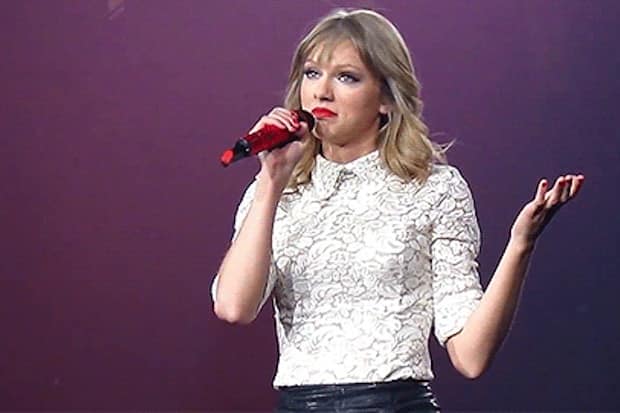The Taylor Swift concert I attended last night was my first, though it didn’t feel like it. I bought her Speak Now World Tour Live CD/DVD in 2011, a few months after the peak of my obsession, when she was dating Jake Gyllenhaal and they were spotted a few times around my neighborhood in Brooklyn. From my couch, I’ve seen enough T Swift Daily live clips, live GIFs and behind-the-scenes photos to feel like a seasoned veteran. I have a homemade shirt, and I've made a tribute video. And that’s how I know that last night I was too late. My ideal Taylor Swift concert happened a few years ago, and I wasn’t there.
In Newark last night, Swift’s best piece of onstage dialogue was when she said, “I write songs about my feelings. I’m told I have a lot of feelings.” (That moment is captured in the GIF above.) That's a central tenet of her most recent album, Red, essentially Swift's version of a college diary, released when she was 22. Red features some earnest attempts at self-awareness (reflecting on her fame on “Lucky Ones”) but it is, more importantly, marked by modest experimentation (trying electronic sounds on “We Are Never…” and “Starlight,” and more frank sensuality on “Treacherous”). With Red, Swift licenses young people to try out different ways to be without forcing them to settle on any path in particular, allowing them to feel many things at once. The same freedom to make your own decisions, even if they’re contradictory and sometimes crossed-up, was on display in the concert's confusingly sequenced costumes: contemporary J. Crew casuals, ’30s long gloves and formal dresses with trains, near-bondage black leather and finally the outfit of a drum majorette.
On the Speak Now tour, Swift performed with ridiculous set-pieces, crosses between mason jar twee and practically steampunk, but because the musical and visual environment was more akin to Prairie Home Companion or Grand Ole Opry than that of contemporary Billboard-topping artists, she seemed like she was just doing her own thing. But as Swift has transitioned herself with Red to be a proper pop star, rather than a country singer, she’s made her live show vulnerable to new, unfavorable comparisons. She has essentially slipped into the wake of pop stars of the past few years, like Rihanna, and Britney Spears a decade ago. Swift's performance of “Lucky Ones,” for example, which sees her pursued onstage by an obsessive cadre of trench-coated photographers, bears striking similarities to Britney Spears’ “Lucky” and even Lady Gaga’s VMA performance of “Paparazzi.” There had not been, in recent memory if ever, a crossover country-pop singer like Swift; when you take the country out of that equation, she doesn’t seem so singular.
Taylor Swift’s discography is about little steps of growth, but that also prevents her from going back. It was no surprise she didn’t play “Tim McGraw,” her first hit, written in ninth grade. But even more so, it’s no surprise that, since she did play “22,” she didn’t do “Fifteen.” Increasingly, through public appearances and her onstage monologues, Swift has embraced her place as a role model to young women by assuming the position of a sort of big sister/schoolteacher. This started with her first unveiling of Red, in a press conference that saw her seated while fans sat on the floor in a circle around her, like children being read a nursery story. At one point last night, sitting on a wooden stool and playing the banjo, she told the audience, “I think you and I have a lot in common.” As a moralistic singer, Swift seems to place great importance on sharing her experience of growing up—this is why “Fifteen” and “22” are such important touchstones, and why she opened the latter last night with a long montage of home movies, each chapter titled by her age at the time. Now, in her early 20s, she's also emphasizing, maybe a little preemptively, being grown up. In her monologue before her anti-bullying song “Mean,” she said, “No matter whether you're 45 or 82, someone is going to be picking on you.” I wonder what it must be like for a 23-year-old to feel so universal.
But sometimes self-positioning herself to stand for everyone pays off, most affectingly last night on “All Too Well,” Red’s most aching, visceral breakup song, supposedly about Jake Gyllenhaal. Putting her whole body into playing the piano, she drove through till the song’s near-climax, with one verse left, then stopped. She stopped and the music stopped, and she stared—gloriously pained, straight over the crowd and straight into some hidden camera, which zoomed in on her face—wounded but still strong—and projected it enormously on screens above the stage. She stared, neck tight and jaw fixed, as if by facing down that imaginary persecutor she was doing it for us, absorbing every time we didn't face our own persecutors, giving us strength to try next time.
Besides that moment, last night, I was adrift. Something I couldn’t quite pin down what left me unsettled—maybe a combination of her changing pop image and of confronting, in person, my longtime obsession. I wonder if the thousands of moment-in-time photos of Taylor on T Swift Daily, and the permanence of her songs—locked at age 15, or 22, or in these preserved scenes, like We dance around the kitchen in the refrigerator light—didn’t set me up to feel troubled when her performance was a real, fleshy, mistake-prone thing. Is that why the thing I enjoyed most about seeing Taylor Swift live was singing along, as if I could prevent the imperfect, real version from intruding on my ideal image by literally screaming overtop of it? During her duet with Ed Sheeran, something went wrong, and for a half-verse he sang and strummed his guitar a half-beat too late; did it bother me because it was an unpleasant sound, or because it wasn’t “the song,” this thing they once made but that now belongs to me?
Taylor Swift’s career is on a trajectory that I’m not sure I’ll stick around for. Something always changes, so what will come next? Will she end the string of boyfriends and quarterly heartbreak by experiencing (and singing of) long-term monogamy, or will she find utter aloneness? And isn’t the latter more likely, just given the lives of people in their 20s? Will she swathe herself in gloom or divert attention from it with songs of mindless, friendly party-pop? Could it be anything but the latter? When I tell myself that the Taylor I want to hear next is the one who is totally depressed—because I think that’ll be her route back to country music and the simple, emotive instruments over which she sounds unique—I wonder why I'd want her to feel bad, why I want anything to go wrong for a person I ostensibly admire. In some ways, that thought is what troubles me most of all. In any case, I think the high point of identification for me has passed. Last night, when her last song ended, the lights quickly came on, along with a recording of The Postal Service’s “Such Great Heights.” There was no encore.



